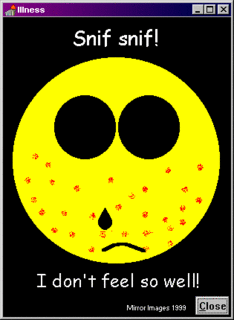All went well with the birthday weekend, and now it's over and done with and that's probably for the best.
I am not usually one to get caught up on age. I just happen to be working on
a show right now where the average age of the cast is probably twenty-four or so. Maybe twenty-three. Because some of the actors are about twenty-eight. But then, some of them are twenty.
So things get said like, "Well the dorky guy (in the play) can be like, in the internet club".
Internet club?
Or one of the actresses tells me that her father is sending her photos of her from the eighth grade (which eventually will be used in the program) via email. And I say, "Oh, is he scanning them in and sending them to you?" and she says, "No, he took them on a digital camera. When I was in eighth grade. Six years ago."
Yeah. Umm. Right. Digital cameras in the eighth grade.
I do remember when I was about ten being at a state fair of some sort and having my picture taken by a computer and then printed out in big black and white dot matrix pixels. So, digital camera technology must have existed...
Here:
The Arrival of True Digital CamerasThe first true Digital Camera, that recorded images as a computerized file, was likely the
Fuji DS-1P of
1988, which recorded to a 16MB internal memory card that used a battery to keep the data in memory. This camera was never marketed in the United States.
The first commercially available digital camera was the
1991 Kodak DCS-100, the beginning of a long line of professional SLR cameras by Kodak that were based in part on film bodies, often Nikons. It used a 1.3 megapixel sensor and was priced at $13,000.
The move to digital formats was helped by the formation of the first
JPEG and
MPEG standards in 1988, which allowed image and video files to be compressed for storage. The first consumer camera with an
LCD display on the back was the
Casio QV-10 in
1995, and the first camera to used
compact flash was the
Kodak DC-25 in
1996.
2003 saw the introduction of the
Canon Digital Rebel, also known as the 300D, a 6 megapixel camera and the first DSLR priced under $1,000, and marketed to consumers.
(courtesy of wikipedia)
Being from Rochester, digital camera technology also marked the fall of Kodak. Fuji was a dirty word in my town.
In other news...
*I met Cory Booker when I lived in New York.
This is a good story.
*I watched
In Her Shoes on Saturday. It is indeed watchable but has plot holes the size of Texas. The timeline was all out of whack. Nobody sees the Cameron Diaz character for months when she disappears to Miami, and yet no one in the family seems to notice or register any level of concern? And Toni Collette and her sweet jewish lawyer man move from first date to engagement in like, two months time, which seems, well, unrealistic. I know. It's a movie. Shirley Maclaine however, is quite wonderful I think.
*I'm kitty sitting for
Dorothy this week. Beatrice (the cat) was very confused to see a lump of human still in the bed at 8:30 am this morning. Her mama normally walks dogs (who are also away for the week) or runs long distances, very early in the morning. Her surrogate mama does nothing of the sort. They have lots of tv channels at their house which is an irresistible temptation since we don't really have tv in my house. It does suck you in. Last night I watched
this and
this.
Both made me a little bit queasy. It would be a very tough call to say which one was worse.











